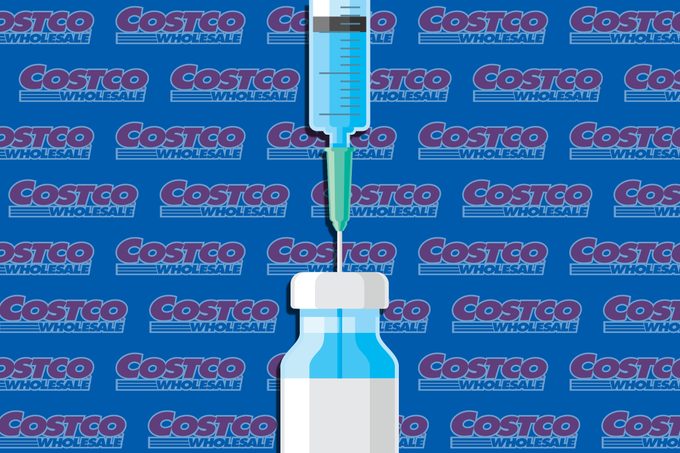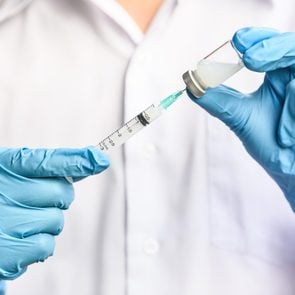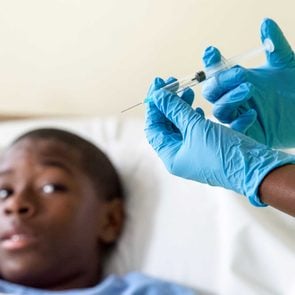How to Get a Flu Shot at Costco
Updated: Dec. 07, 2020
Flu season is here—but so are vaccines. Costco is one of many retailers that offer immunizations. Here's how to get the Costo flu shot.
Getting a Costco flu shot
In a year when everyone is fixated on SARS-CoV-2, the virus that causes Covid-19, it’s easy to forget that there is at least one potentially serious respiratory disease you can protect yourself from. But Americans clearly haven’t forgotten. They’re lining up in droves to get their flu shot.
Vaccine manufacturers are on track to deliver 194 to 198 million doses for the 2020-2021 flu season, about 30 million more than last year, according to the Centers for Disease Control and Prevention (CDC). About 30 percent of flu vaccines are given in retail settings and Costco is one of them. Members of the large warehouse chain can get the flu vaccine at Costco pharmacies. (Be prepared and know what to do at the first sign of the flu.)

Who should get the flu vaccine?
Almost everyone. The CDC’s guidelines recommend that everyone over the age of six months get immunized. It’s especially important for high-risk groups—people 65 and over, pregnant women, children under five, and people with chronic health conditions such as diabetes, asthma, or heart disease. If you’re allergic to any of the ingredients in vaccines, or you’ve had Guillain-Barre Syndrome, flu symptoms, or another illness, talk to your doctor before getting a vaccine. (Here’s what you need to know about the flu virus.)
Is the vaccine safe?
In a word, yes. Any flu myths you may have heard—that the flu vaccine can cause the flu or that the vaccine can cause autism—simply aren’t true. The vaccine only contains inactivated or “dead” pieces of the virus, which aren’t enough to make you sick. You may, however, have small side effects such as a sore arm from the shot.
You may also get a headache, slight fever, muscle aches, or nausea, all of which usually disappear on their own. A very few people may have an allergic reaction to the vaccine. Symptoms might include trouble breathing, swelling, or a rapid heartbeat. If you experience any of these, call 911. (Worried it’ll hurt? Here’s how to deal with flu shot pain.)
What kinds of vaccines are available?
Every year, manufacturers produce more than one flu shot; there are actually several different types. Most of them are shots, while a few come in the form of a nasal spray, called FluMist. Almost all the vaccines this season protect against four circulating flu viruses.
Most (87 percent) have no or little thimerosal—a mercury-based preservative to prevent germs from growing—and 20 percent will be egg-free. Talk to your doctor or pharmacist about which option is best for you.
The Costco flu shot includes Fluad, a vaccine specially formulated for seniors ($46.50 if you don’t have insurance); Afluria and Flucelvax for ages three and up ($19.99); and FluMist for $24.99.
When is the best time to get a flu vaccine?
How about now? Generally, the North American flu season starts around October and peaks between December and February. Early fall is the best time to get inoculated, but it’s never too late for the flu shot. This year’s season hasn’t peaked yet. Bear in mind that the shot takes two weeks to become fully effective.
How do I get the Costco flu shot?
If you’re a Costco member, you can either reserve a time or simply walk in to your nearest Costco pharmacy. (If you’re not a Costco member, you can always sign up.) The store asks that you bring your insurance card as most plans cover the cost of a flu vaccine. You’ll also have to complete and sign an Immunization Consent Form before arriving.
Will I be safe from Covid-19?
Like other large and smaller retailers, Costco has made changes to its procedures to lower the risk of Covid-19. This includes special hours (days and times vary by location) for members 60 and older, those with disabilities, or people with weakened immune systems, which put them at high risk for Covid-19. Healthcare workers and first responders get priority access during all open hours. You’ll have to wear a face mask and practice social distancing.


















